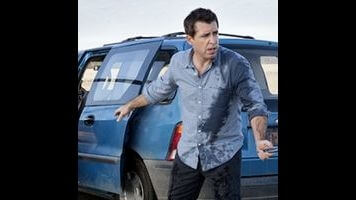A family sitcom created by a husband-and-wife team calls to mind sentimental and safe comedies of the past: Your Raymonds, your Family Matters, and so on. But when the couple in question is The Daily Show alumni Jason Jones and Samantha Bee, the show is as likely to be some milquetoast claptrap as Jones and Bee are likely to stump for the G.O.P. Don’t let the presence of kids or a plot based around a road trip fool you: The Detour is many things, perhaps too many things, but it’s not the slightest bit family-friendly.
Bee and Jones’s brainchild (in which Jones also stars) maintains an illusion of wholesomeness for mere moments before hinting at the sour center it contains. Nate (Jones) and Robin (series MVP Natalie Zea) are stalled on the side of a deserted highway with their two children, twins Delilah and Jared (Ashley Gerasimovich and Liam Carroll). Nate walks Jared through the steps of starting their van, Blue Thunder, so that he and Robin can push and get the family moving again. All familiar territory. But the van doesn’t move, Robin stops pushing (Delilah: “You’re so quick to give up on pushing. I guess that’s why we weren’t born vaginally”), and they realize Jared’s had his foot on the brake the whole time. “I’m trying my best,” he protests. “That’s the disappointing part, honey,” Robin replies.
None of this is to say that The Detour is built on bitterness, although it has its fair share. The show may be closer to Arrested Development than Full (or Fuller) House, but Nate and Robin genuinely want to do good in the world. They want to be good parents and raise good children and have a good relationship and, in Nate’s case, affect positive change on a larger scale. The trouble is, they’re just not very successful at any of that. They tell themselves they’re well-intentioned, and mostly that’s the truth, but of all the detours Nate and Robin encounter in the series, the biggest one seems to be having kids at all. It’s not bitterness, and it’s not cynicism. It’s just honest, and sometimes honesty is the most uncomfortable quality.
Some of what works (and doesn’t work) about The Detour can’t be easily discussed: There are plot twists, jumps in time, unreliable flashbacks, secrets, and lies aplenty. Jones has described the series as a comedic Breaking Bad, and while no one should expect the family to buy an RV and start cooking meth, it’s an apt comparison. The family’s best and worst moments center on honesty, or a lack thereof: For every relatively healthy conversation about sex, there’s an instance of gross over-sharing (the seventh episode, “The Road,” focuses on this almost exclusively), and for every hard truth, there’s an easy lie.
But if any of that sounds a little highfalutin, it’s not: The Detour may take an unsentimental (though occasionally affecting) look at parenting, but someone still gets doused with urine within the series’ first 30 minutes. While some of its loftier ambitions may be a bit hit-and-miss, the sophomoric humor—which comes from grown-ups and children alike—nearly always hits. Jones and Zea have a terrific rapport, both as allies and adversaries, and both kids (Carroll in particular) possess a knack for nailing jokes that their actual parents probably wouldn’t allow them to hear, let alone tell. The Detour is occasionally bawdy, often cringe-inducing, features nearly every bodily fluid, and still manages to be clever, though rarely sophisticated. Put plainly, The Detour is undeniably funny, often in the way that the earliest Adam Sandler movies are funny. Stupid? Yes, but who cares. People are laughing.
It all adds up to a series that could be terrific, or could just as easily wind up as a bit of a mess. In the episodes made available to the press, it often seems that the train is about to come off the track, thanks to one twist or bit of cleverness too many, but just as often, the series rights itself at the last moment. What seems to come out of left field often connects in an unexpected fashion; what might appear to be zany for the sake of zaniness alone is frequently revealed to be something far more relevant. It’s an impressive juggling act, but whether the more ambitious elements work in the end, this is a show worth watching for the family at its center. At the end of the day, it’s perhaps Louie (which also featured Gerasimovich) that serves as the best comparison—no matter where you’re going, raising another human is a pretty cool but messed up journey.


 Keep scrolling for more great stories from The A.V. Club.
Keep scrolling for more great stories from The A.V. Club.